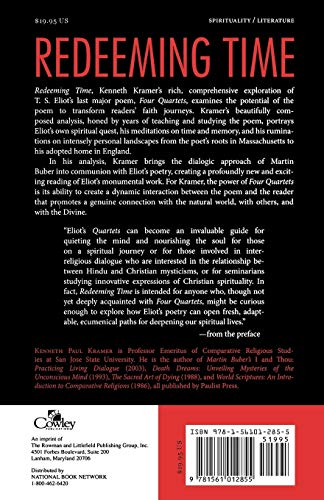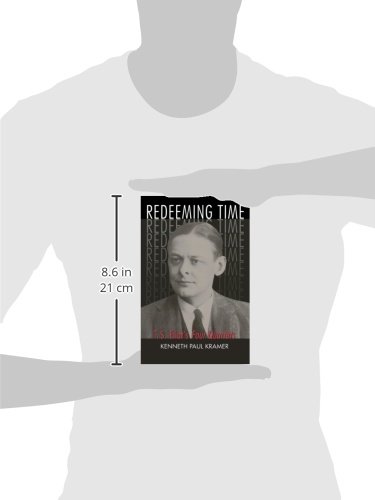Customer Services
Copyright © 2025 Desertcart Holdings Limited




Full description not available
K**Y
Very Helpful Guide To The Four Quartets
Eliot's "Four Quartets" is a difficult read, a mixture of beautiful poetry, powerful images, Christian mysticism, Eastern mysticism, and autobiographical references. Kenneth Paul Kramer has produced a very good guide for the perplexed. Kramer is strongest, I think, with regarding to Eliot's Christian mysticism. Kramer is familiar with such figures as St. John of the Cross, Julian of Norwich, and the unknown author of The Dark Night of the Soul, and his discussion of the importance of these figures for understanding this difficult poem is outstanding. In addition, Kramer is well-versed in Eastern religions, and this book does a nice job of explaining the importance of Buddhist and Hindu concepts in The Four Quartets. Kramer's book also contains some very helpful references to the ideas of Martin Buber and how they help us to understand Eliot's great poem. Although this book is not a biography, a reader needs to know quite a bit about Eliot's life to understand The Four Quartets, and Kramer does a very good job with the biographical information also. Finally, Kramer does a wonderful job of describing the intricate construction of each quartet and how Eliot unifies the four poems into one literary work. "Redeeming Time" also contains extensive, very informative footnotes that add much valuable information. "Redeeming Time" is useful for both scholars and for those who are not familiar with Eliot's work. Indeed if you are reading The Four Quartets for the first time, Professor Kramer's book will help you appreciate both the artistry and the philosophical depth of Eliot's masterpiece. Highly recommended.
W**L
Good; not best.
However rich and suggestive, the Quartets are obscure and maddeningly paradoxical [contradictory]. For me, the Kramer volume is heroic, painstaking exegesis, and quite informative. But in some sense, he just deepens the fog. Stick with Helen Gardner, Russell Kirk, or Lyndall Gordon for first books. Two key terms in Eliot, and in Kramer’s discussion are NEVER DEFINED: “timeless” and “meaning.” The former has to mean something like omnitemporal or eternal, or else is obscurantist nonsense. The stress on ineffability and via negativa is so strong in Kramer that “meaning” seems to be reduced to emotive satisfaction—a "dark night” [John of the Cross] of uncritical fog. Kramer had written a book on Buber, and he over-Buberizes Eliot. Everywhere we have Buber and “dialog,” “mutuality,” “reciprocity.” Not nearly so prominent in Eliot.He sees Eliot primarily through the lens of John of the Cross and monastic retreat from the world. Partly justified by Eliot’s biography perhaps. Kramer’s discussion of Eliot’s use of the Gita’s “renounce fruits of action,” and Theravada Buddhist “desirelessness” seems to add up to a Gnostic denigration of the self and the material world. Proper self-love [vs. inordinate self-love] and proper care for constructive fruit of action in this world barely peep through. One is almost convinced that Eliot was a neurotic Gnostic, until his second marriage, and his last work, The Elder Statesman [dedicated to his new wife]. I remember Eliot reading his poems at S. M. U. in the late ‘50s. His new wife was with him, and they seemed to radiate serenity and quiet joy. Perhaps her accepting love mediated the grace to transcend his sense of guilt and despair.
B**D
An excellent guide to Four Quartets
T.S. Eliot's Four Quartets is one of the most difficult and obscure poems ever written. Kenneth Paul Kramer's Redeeming Time is an excellent guide to understanding the poem's hidden meanings. The author has devoted more than thirty-five years to Eliot's masterpiece: he wrote his Ph D. thesis on Four Quartets, made numerous research trips to all four locations of the titles to each poem, taught courses on it at university, and continued his study of the poems while writing numerous books. Redeeming Time is well-written,clearly organized, and includes one hundred pages of Notes in the back of the book, plus a bibliography of the works cited and an index. This is truly a scholarly work. Best of all, Kramer's analysis unlocks many of the difficulties for the reader. I found this book to be the most helpful and useful analysis on Four Quartets written thus far.I highly recommend it.
T**N
Redeeming Time
So far I just haven't gotten into the book. The poem is like 40 pages and the book explaining "Four Quartets" is 400? But I'm ignorant. I expect in a few years I'll wrestle with both books and see jewels under the puzzling lines of Eliot
S**M
Opinions and intellectualizing
The Quartets are great poetry, but this overweening PhD thesis is the opposite of poetry. Wish the whole thing was cut to a quarter, and all of the windy theorization culled. Some good facts are here, but better to read the Bhagavad Gita in the original than suffer the author's hands-off opinions about its relation to the Quartets. I recommend Satchidananda's Bhagavad Gita (Yogaville, VA).
G**I
Very good analysis!
The author knows his topic inside and out. The argument is cogent and readable. Nice charts are very useful. The author provides much appreciated schematics and makes this difficult poem understandable and easy to convey to students.
E**A
Three Stars
IT misses the original poem, It is a noche interpretation, but should have included the poem
C**N
Enspiritualised intellectual meditations.
No other study of "Four Quartets" has enriched and challenged my critical appreciation as "Redeeming Time" does. Thanks for brilliant communications with Eliot's intellectual spirit.
S**T
A Complete Guide to TS Eliot
This is s thorough-going compendium of Elliot’s work and life. An invaluable book for beginning research projects related to Eliot. Well organised and well written.
L**A
Super service et très beau livre...
Grande fan de T.S.Eliot, je suis très heureuse de constater que mon livre est arrivé dans un état quasi-parfait. Je suis très satisfaite du service de livraison. Merci.
P**I
Five Stars
Good
Trustpilot
2 months ago
1 day ago